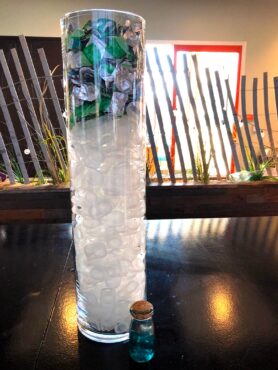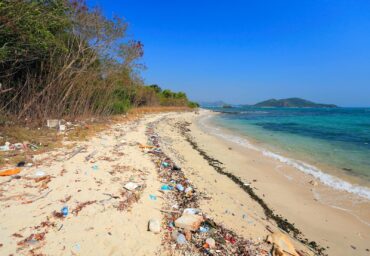
When it comes to recycling, you may not often think about something as small as your contact lenses. Did you know, though, that 45 million Americans who wear contact lenses flush anywhere between 1.8 and 3.36 billion lenses down the toilet or sink per year? As a result, contact lenses could be contributing to the trillions of microplastics in waterways that can harm marine wildlife and even enter our food supply.
This Earth Day, celebrated on April 22, is an excellent time to adopt new habits in an effort to go green. If you’re like many people, you’ve probably already made a few changes to your routine, from switching to reusable water bottles and reusable grocery bags, even to composting. There are everyday sustainable solutions for so many parts of our lives — did you know there’s even one to recycle our contact lenses and to help reduce microplastic exposure in our environment? Here’s what to know:
Because of their small size, contact lenses can get filtered out of regular recycling center facilities and end up in landfills. Understanding the impact this could have on the environment, Bausch + Lomb, the makers of Biotrue ONEday daily disposable contact lenses joined forces with TerraCycle, a global leader in recycling hard-to-recycle waste, to develop the first and only contact lens recycling program available in the U.S., the ONE-by-ONE Recycling Program. The program collects contact lens waste, which is then separated based on composition and melted into plastic that can be combined with other recycled materials to become playground sets and park benches. Most recently Bausch + Lomb took the program one step further by repurposing the recycled waste to create custom training modules that were donated to the Guide Dog Foundation, a national not-for-profit that trains guide dogs for people who are blind or visually impaired. The modules, which were funded by the Bausch Foundation, included benches, tables, waste stations and an agility ramp used to train the dogs and to further enhance the organization’s Smithtown, N.Y. campus for those who visit. Launched in 2016, this first-of-its-kind recycling initiative has already collected and recycled nearly 30 million contact lenses, blister packs and top foils and processed about 180,000 pounds — the equivalent weight of six school buses.
 This free recycling program accepts used contact lens materials from Biotrue ONEday, as well as other brands. To participate, simply collect your used contact lenses, plus the blisters and foil they come in, and bring them to a participating eye care provider. There are over 5,600 eye care providers enrolled in the program nationwide. To find one near you, visit www.bauschrecycles.com.
This free recycling program accepts used contact lens materials from Biotrue ONEday, as well as other brands. To participate, simply collect your used contact lenses, plus the blisters and foil they come in, and bring them to a participating eye care provider. There are over 5,600 eye care providers enrolled in the program nationwide. To find one near you, visit www.bauschrecycles.com.
While this change may seem small, it has the power to make a big impact on global recycling efforts, making it an excellent habit to start adopting today.








